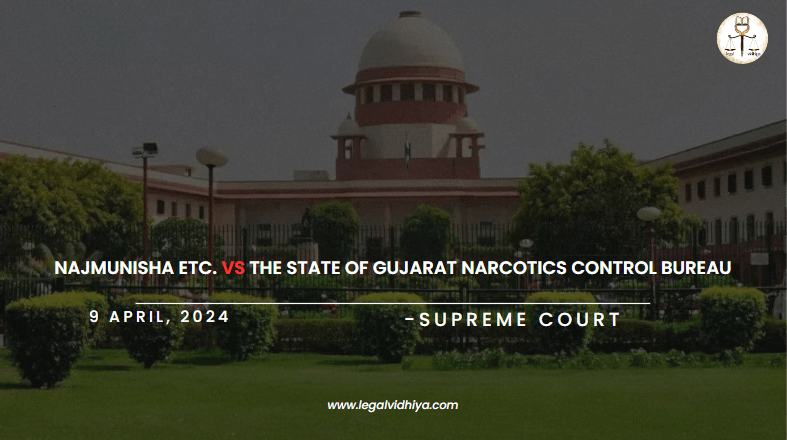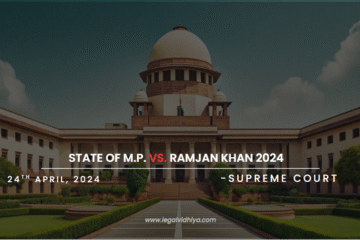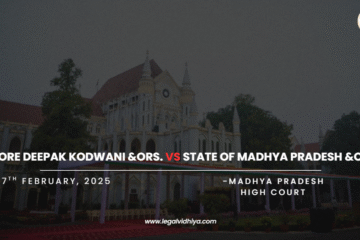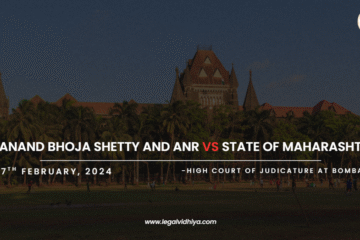
| CITATION | 2024 INSC 290 |
| DATE OF JUDGMENT | 9 April, 2024 |
| COURT | Supreme Court of India |
| APPELLANT | SMT. NAJMUNISHA ABDUL HAMID CHANDMIYA ALIAS LADOO BAPU |
| RESPONDENT | 1. THE STATE OF GUJARAT2.NARCOTICS CONTROL BUREAU |
| BENCH | Justice Augustine George MasihHon’ble Mr. Justice Aniruddha Bose |
INTRODUCTION:
The present case delves into the intricacies of the Narcotic Drugs and Psychotropic Substances Act, 1985 (NDPS Act), a special legislation enacted to combat the menace of drug trafficking and substance abuse in India. The judgment revolves around the interpretation and application of pivotal provisions of the NDPS Act, particularly Sections 41, 42, and 67, concerning search, seizure, and admissibility of confessional statements. The case highlights the delicate balance between the State’s obligation to curb drug-related offenses and the fundamental rights of the accused enshrined in the Constitution of India. It underscores the need for strict adherence to statutory safeguards and procedural requirements to ensure a fair trial and uphold the principles of natural justice.
FACTS OF THE CASE:
1. The facts of the case emanate from an incident that unfolded on December 10, 1999.
2. When Mrs. Krishna Chaube, an Intelligence Officer/Inspector with the Narcotics Control Bureau (NCB), received secret information that Accused No. 4 (Abdul Hamid Chandmiya alias Ladoo Bapu) would be carrying narcotic substances in an auto-rickshaw bearing a specific registration number the following day.
3. Acting on this information, a raiding party was formed, and on December 11, 1999, they attempted to intercept the auto-rickshaw as per the intelligence. However, when the raiding party tried to stop the auto-rickshaw, Accused No. 4 allegedly fled the scene, leaving behind the vehicle abandoned with 1.450 kilograms of charas (a narcotic substance) and a driving license belonging to one Shri Abdulgafar Gulamali Shaikh alias Rajubhai.
4. Subsequently, the raiding party proceeded to the house of Accused No. 4, where Accused No. 1 (Smt. Najmunisha, the wife of Accused No. 4) was present. Upon searching the house, the raiding party recovered an additional 2.098 kilograms of charas concealed in a cement bag in the open kitchen. Accused No. 1 and Accused No. 2 (Abdul Rajak, the son of Accused No. 1 and Accused No. 4) were arrested, and eventually, Accused No. 4 was also apprehended on June 26, 2000.
ISSUES RAISED:
The primary issues raised in this case were:
- Whether Admissibility of statements recorded under Section 67 of the NDPS Act as confessional statements?
- Whether the provisions of Sections 41 and 42 of the NDPS Act regarding the recording of information, search, and seizure and arrest without warrant are limited?
CONTENTIONS OF THE APPELLANTS:
1. The appellants argued that the statements recorded under Section 67 of the NDPS Act were inadmissible as confessional statements, relying on the Supreme Court’s decision in Tofan Singh v. State of Tamil Nadu. In that case, the Court held that statements recorded under Section 67 cannot be used as confessional statements in the trial of an offense under the NDPS Act.
2. The appellants contended that the search conducted at the house of Accused No. 4 was illegal and in violation of Section 42 of the NDPS Act. They argued that the secret information received pertained only to Accused No. 4 carrying contraband in an auto-rickshaw and did not mention the existence of any contraband at their residence. Therefore, the subsequent search of the house was beyond the scope of the recorded information and failed to comply with Section 42’s requirements.
3. The appellants highlighted various inconsistencies and fallacies in the prosecution’s case, including discrepancies in the panchnama (seizure memo) and the testimonies of prosecution witnesses. They argued that these inconsistencies and irregularities cast doubt on the credibility of the prosecution’s case and warranted acquittal.
CONTENTIONS OF THE RESPONDENT:
1. The respondent argued that there was substantial compliance with the statutory requirements under Section 42 of the NDPS Act regarding the recording of information and conducting the search and seizure. They claimed that the search at the house of Accused No. 4 was a continuation of the action taken based on the secret information or was based on the personal knowledge of the Gazetted Officer, Mr. Tomar.
2. The respondent contended that the statements recorded under Section 67 of the NDPS Act were admissible and could be relied upon for conviction, along with other evidence. They argued that these statements were corroborated by other evidence and should not be disregarded solely based on the Tofan Singh judgment.
3. The respondent asserted that there were no material contradictions in the testimonies of prosecution witnesses and that the evidence presented by the prosecution inspired confidence. They argued that the minor inconsistencies highlighted by the defense did not go to the root of the matter and should not be grounds for acquittal.
JUDGMENT:
After carefully considering the arguments from both sides, the Supreme Court allowed the appeals and set aside the convictions of Accused No. 1 and Accused No. 4, acquitting them of the charges. The Supreme Court relied on the precedent set in Tofan Singh v. State of Tamil Nadu and held that the statements recorded under Section 67 of the NDPS Act were inadmissible as confessional statements against the accused. The Court reasoned that Section 67 is at an antecedent stage to the investigation and does not meet the threshold of a confessional statement. Consequently, these statements could not be considered to convict the accused under the NDPS Act. Furthermore, the Court held that the search was not based on the personal knowledge of the Gazetted Officer, Mr. Tomar, as claimed by the prosecution. The testimonies of prosecution witnesses revealed inconsistencies and lack of clarity regarding the source of information or personal knowledge that led to the search of the house. The Court observed that the raid and search conducted at the house of Accused No. 1 and Accused No. 4 violated the statutory requirements of Section 42 of the NDPS Act. The search was carried out without adhering to the mandatory provisions regarding recording and conveying information to the superior officer, as prescribed by Sections 42(1) and 42(2).
The Court noted several inconsistencies and discrepancies in the prosecution’s case, including the testimonies of witnesses and the preparation of the panchnama. These irregularities cast doubt on the credibility of the prosecution’s case and undermined the confidence of the Court in the evidence presented.
ANALYSIS:
This case became one of the Precedent for future cases. The Supreme Court’s judgment provides clarity on the interpretation and application of Sections 41, 42, and 67 of the NDPS Act. It reiterates the importance of strict compliance with statutory requirements, particularly concerning search, seizure, and recording of information, to safeguard the rights of the accused and ensure a fair trial.
The Court’s reliance on the Tofan Singh case highlights the inadmissibility of statements recorded under Section 67 of the NDPS Act as confessional statements, limiting their evidentiary value in convicting an accused.
Additionally, the judgment emphasizes the need for a clear nexus between the information received and the subsequent search and seizure, ensuring that the actions of the investigating authorities are within the bounds of the law.
CONCLUSION:
The Supreme Court’s judgment in this case underscores the significance of adhering to statutory provisions and safeguarding the rights of the accused in the context of the NDPS Act. It serves as a reminder to investigating authorities to meticulously follow the prescribed procedures and ensure that their actions are supported by valid information and personal knowledge, as required by the law.
REFERENCES:
- Narcotic Drugs and Psychotropic Substances Act, 1985
- Indian Evidence Act, 187
- Tofan Singh v. State of Tamil Nadu (2021) 4 SCC 1
- Karnail Singh v. State of Haryana (2009) 8 SCC 53
- Darshan Singh v. State of Haryana (2016) 14 SCC 358
- Balbir Singh v. State of Punjab (1994) 3 SCC 299
This paper written by Shivam kumar Sahu as an intern in Legal Vidhiya
Disclaimer: The materials provided herein are intended solely for informational purposes. Accessing or using the site or the materials does not establish an attorney-client relationship. The information presented on this site is not to be construed as legal or professional advice, and it should not be relied upon for such purposes or used as a substitute for advice from a licensed attorney in your state. Additionally, the viewpoint presented by the author is of a personal nature.




0 Comments